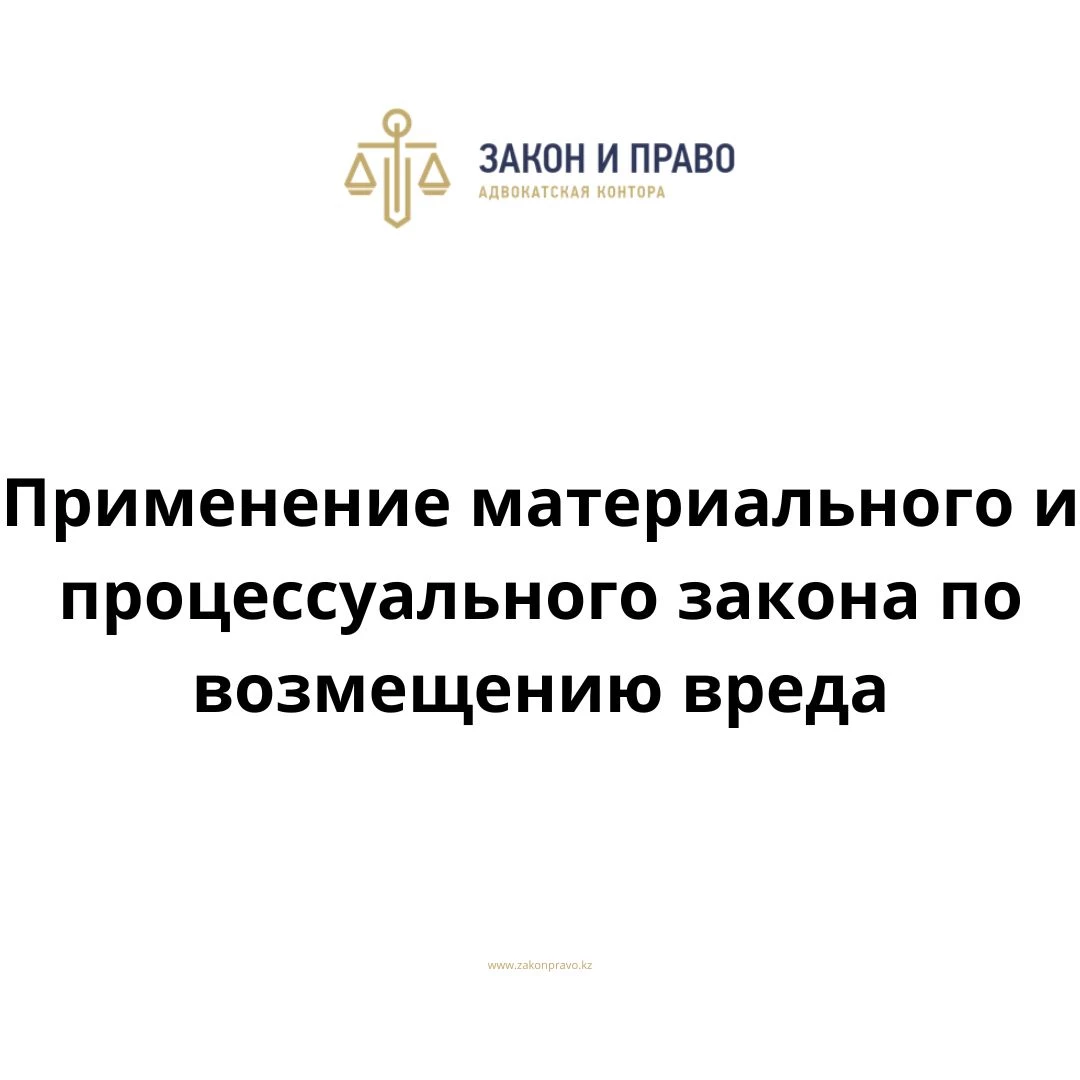Application of the substantive and procedural law on compensation for harm
Damage to the health or death of a citizen is possible due to various factors, the most common of which are the performance of labor or official duties, criminal acts, and the action of sources of increased danger.
In order for the causer of harm to have an obligation to compensate for harm, in addition to the very fact of causing harm, it is necessary to have a set of common grounds for civil liability.
The general grounds for civil liability for causing harm are provided for in Article 917 of the Civil Code of the Republic of Kazakhstan.
Article 931 of the Civil Code of the Republic of Kazakhstan regulates liability for harm caused by activities that create increased danger to others (a source of increased danger).
According to paragraph 1 of Article 931 of the Civil Code of the Republic of Kazakhstan, in order to compensate for harm caused by a source of increased danger, the very fact of harm caused by a source of increased danger and the causal relationship between activities that create increased danger to others and the consequences that have occurred are necessary.
In paragraph 1 of Article 931 of the Civil Code, the legislator determined that the damage caused by a source of increased danger is compensated in all cases, with the exception of only two circumstances proven by the owner of the source of increased danger: if the damage occurred due to force majeure or intent of the victim.
Thus, the Kostanay District Court of the Kostanay region issued decisions on January 09, 2015 and May 22, 2015 on recovery of material damage and compensation for moral damage in connection with injury to health, fright, and dog attacks.
It is not disputed that dogs are a source of increased danger and responsibility for causing harm as a source of increased danger is regulated by art. 931 of the Civil Code of the Republic of Kazakhstan.
The court satisfied the claims in the cases of S.I. Gorodova's claim against A.A. Karimova and S.V. Smirnova's claim against S.M. Kovalev due to the presence of evidence of both the fact of harm to the plaintiffs' health in connection with the attack on them by dogs and the expenses incurred by the plaintiffs for medical treatment and the purchase of clothing. In both cases, it was established that the dog owners were brought to administrative responsibility for violating the rules of animal husbandry. In both cases, the court motivated the decisions by reference to art. 917 of the Civil Code, which is the general norm, should have been guided by art. 931 of the Civil Code in these cases.
In cases of compensation for injury to health in connection with road accidents, courts in different regions have developed different practices regarding the involvement of insurance companies in cases.
Thus, by the decision of the Oktyabrsky District Court of Karaganda dated December 26, 2014, the satisfaction of the claims of Karagandyzhylusbyt LLP against Abilov E.H. for compensation of material damage in the amount of 25,000 tenge was denied. In refusing to satisfy the claims, the court proceeded from the fact that, in accordance with art. 924 of the Civil Code of the Republic of Kazakhstan, a legal entity or a citizen who has insured his liability through voluntary or compulsory insurance, if the insured amount is insufficient to fully compensate for the damage caused, reimburse the difference between the insured amount and the actual amount of damage.
From the literal interpretation of this provision of the law, it follows that a person who has insured his liability under compulsory insurance does not reimburse the full cost of the damage caused, but only the difference between the insured amount and the actual amount of damage, if the amount of the insurance payment does not cover the amount of damage.
Thus, the obligations to compensate for damage caused as a result of a traffic accident on 09/10/2014 due to the fault of Abilov E.H. arise from JSC Tsesnabank subsidiary Tsesna Garant Insurance Company. During the trial, the plaintiff's representative did not replace, did not involve Tsesna Garant Insurance Company, a subsidiary of Tsesnabank JSC, as a co-respondent, insisted on filing a claim against Abilov E.H. Taking into account these circumstances, the court considered Abilov E.H. as an improper defendant in this case, he refused to satisfy the claims of Karagandyzhylusbyt LLP against Abilov E.H. for compensation for material damage.
Attention!
Law and Law Law Law draws your attention to the fact that this document is basic and does not always meet the requirements of a particular situation. Our lawyers are ready to assist you in legal advice, drawing up any legal document suitable for your situation.
For more information, please contact a Lawyer / Attorney by phone: +7 (708) 971-78-58; +7 (700) 978 5755, +7 (700) 978 5085.
Attorney at Law Almaty Lawyer Legal Services Legal Advice Civil Criminal Administrative Cases Disputes Protection Arbitration Law Firm Kazakhstan Law Office Court Cases
Download document
-
Решение суда о взыскании капитализированных платежей по возмещению вреда, причиненного жизни и здоровью
1905 downloads -
Решение суда о возмещении вреда в связи со смертью кормильца
1923 downloads -
Решение суда о возмещении вреда, причиненного повреждением здоровья и взыскании морального вреда
1916 downloads -
Решение суда о компенсации морального вреда
1896 downloads -
Судебное решение о взыскании суммы за причинение вреда здоровью и возмещении морального вреда
1902 downloads -
Судебное решение о возмещении материального и морального вреда
1918 downloads -
Судебное решение о возмещении материального и морального ущерба
1919 downloads -
Судебное решение о возмещении морального вреда, взысканию материального ущерба и убытков
1917 downloads -
Судебный акт о возмещении материального вреда
1896 downloads -
Судебный акт о возмещении материального ущерба и морального вреда
1973 downloads -
Судебный акт о возмещении материального ущерба и морального вреда
1934 downloads


